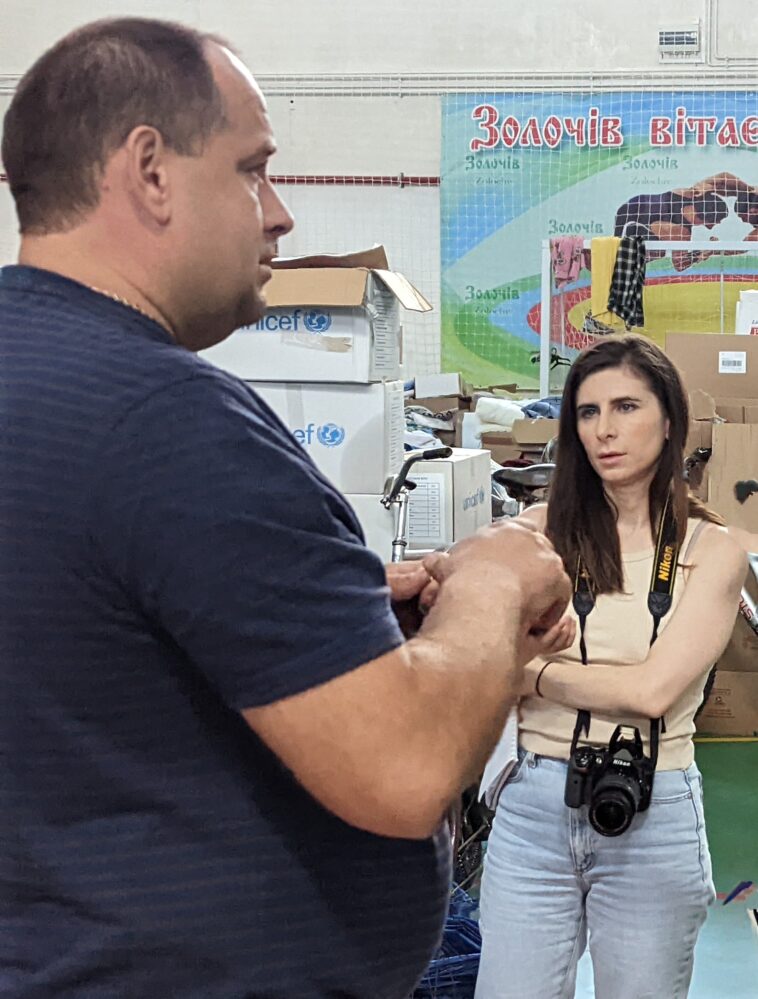Morning turned into afternoon. A scorching sun blanketed the concrete of the local sports hall belonging to the community of Zolochiv, a frontline village just minutes from the Russian border.
There, over the course of several hours, the International Committee for the Red Cross, with the help of local residents, unloaded over 20 tons of supplies for the besieged townsfolk. The town’s mayor, Viktor Kovalenko, who for the preceding five months valiantly rallied the community against Russian aggression, oversaw the delivery.
An unassuming bisexual journalist who had returned to the city where she was born just days prior reported on the mission. Natalie Vikhrov shadowed Kovalenko and his team, covering the delivery and interviewing members of the community’s health, humanitarian, and security apparatuses. She was there, next to the mayor, as the Red Cross pulled away and the Russian rockets fell.
As Kovalenko barked out orders and headed into the bomb shelter to help lead the response against the early afternoon attack, she stayed by his side.
Never Miss a Beat
Subscribe to our newsletter to stay ahead of the latest LGBTQ+ political news and insights.
As a bisexual woman, Vikhrov has learned how to “make tough decisions.” Born in Kharkiv when Ukraine was still a part of the Soviet Union, Vikhrov’s working class parents made the decision to leave for Adelaide, Australia when she was 8 years old. As the USSR crumbled around them, her parents “wanted a better life for me and my sister.”
Now comfortable with using both queer or bisexual to describe her sexuality, in high school “it didn’t click,” for her that she was sexually different in any way.
“We didn’t have the access to the resources and communities that we have now, as a teenager in Adelaide I didn’t feel I had access to anything that helped me figure out my sexuality,” Vikhrov told LGBTQ Nation.
Coming out “gradually” in her mid 20’s, Vikhrov also found her career goals change in the last year of college when a professor suggested she look into journalism as a profession. She began to pursue a master’s degree in Journalism, eventually taking a position with The Bunyip, a South Australian newspaper.
Remaining with them for almost five years, covering local community and political affairs, the daughter of both Ukraine and Australia “always wanted to cover international news and foreign affairs, but it felt like a distant dream.”
Although coming from Kharkiv and speaking Russian at home as a child, Vikhrov didn’t “have many memories of my childhood in Kharkiv” and ultimately felt “more Australian than Ukrainian.”
Then in 2014 the Maidan Uprising swept across Ukraine, Vikhrov got her first “taste of reporting on foreign affairs” when she left Australia for London to report on the story. With support from the paper, she moved there in 2015. In London, for the first time, she came out as bisexual, moving past the transitory wording of “bicurious.”
For Vikhrov there just wasn’t ”a reason to come out earlier.”

“Not every person’s experience is linear,” she said. “When people know their sexuality quite clearly, it is a different experience than being bisexual. For me [labels] are to explain to the world that I’m interested in both men and women. It’s just to notify people that I date women too. It’s more for other people, but labeling myself is for the outside world vs anything it did for my own self.”
“You continue the process of coming out with every new person you meet, and every new place you go. It’s completely valid for people to understand their sexuality and explore it.”
Vikhrov’s journey accelerated in the middle of 2016 when she made the leap from London to Kyiv, taking employment with the Kyiv Post, and bringing her back to live in her native nation for the first time since she left more than two decades prior.
Once she had full-time employment in Ukraine secured, Vikhrov began to look more closely at the LGBTQ community in Ukraine and “felt there was a gap in coverage.”
“I wanted to fill that gap,” she said, so she became a freelancer. It allowed her to explore the trials, tribulations, and victories of Ukrainians who weren’t as commonly visible in the media.
Having seen friends get physically hurt at the hands of anti-LGBTQ activists over the years, Vikhrov is “quite aware that there is still work to be done” for queer acceptance but acknowledges that “Ukraine needs to focus efforts on the war at the moment.”
Three days after the full-scale invasion commenced, she left the capital for Moldova before arriving in London once more, noting she “didn’t have security, a driver, a team behind me. I’m a freelancer on my own.” Yet, once more she returned to Ukraine, arriving again in May.
Why did she come back?
“I did it because it’s my job and because it was something I felt I need to do. I’ve been covering this country for years and I wanted to show what was happening here, what Ukrainians were going through.”
She then shared what has been the key driver of her life’s philosophy, and what originally led her overseas.
“I believe in approaching things that scare you, and part of why I ended up here was because I took a direction that scared me, and that’s important.”
Don't forget to share:













